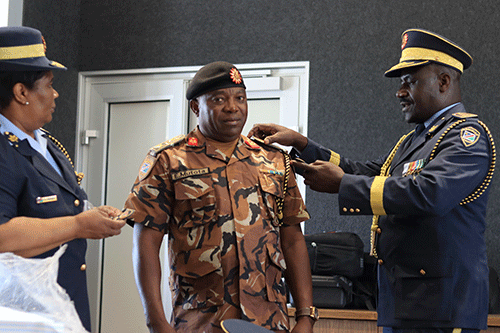Namibian Police supremo Joseph Shikongo has made a raft of changes at the top echelons of the force.
The appointment of Elias Mutota as deputy inspector general responsible for operations is Shikongo’s most significant appointment.
It is Shikongo’s first major shuffle since taking over from Sebastian Ndeitunga who went into retirement in August.
“Let us go and work. You are younger than me. I expect you to change the face [of crime prevention],” he told journalists in Windhoek yesterday.
It was his first media briefing since taking charge of the police.
Mutota, who headed the police’s Special Field Force, was replaced with Willem Steenkamp. “Go out there and make sure our borders are secured,” was Shikongo’s rumbling directive to Steenkamp.
All appointments are effective today.
At least 15 changes were effected to the force, moves seen as Shikongo stamping his authority and flexing his administrative powers.
Justifying the changes, a bullish Shikongo said his actions were in the best interest of the force and by extension, Namibia.
According to him, the new promotions and appointments are fair, unlike in the past where those leading the police only promoted their kith and kin.
“These things of ‘he is promoting Tswanas or this tribe or his girlfriends’ are a thing of the past. You can see for yourself,” the police boss said cheekily.
On face value, the appointments were relatively balanced, with a mixture of youth and experience, while gender parity also factored in.
On the day, the career police officer also poured cold water over allegations that he wants to get rid of deputy IG for administration Anne-Marie Nainda.
In fact, the opposite is true, he said.
“We are united. Those who are saying that [sic]. It is just wishful thinking. My management is united,” he said.
Nainda was recently elected as delegate for Africa on the 13-member executive committee of the International Criminal Police Organisation (Interpol).
He added that Nainda will continue occupying her current role as the Interpol position is not a permanent one.
She will be expected to attend Interpol executive meetings as and when they become available.
“Make us proud as Namibians. We wish her well,” he said, as Nainda looked on.
Disputed rank
He then moved to address the elephant in the room – the creation of a new police rank.
This follows a report by New Era last week that the Namibian Police has come under increasing pressure after it emerged that it is at an advanced stage to create a new rank on its structure.
The position will be known as ‘assistant chief inspector’.
Opponents of the position view it as neglecting junior officers while rewarding those at the top echelons of the force. It was allegedly necessitated by the pay disparity that exists between the position of inspector and chief inspector.
Its conception is at an advanced stage as submissions to that effect are currently with the Public Service Commission (PSC), New Era has learned. At present, a police inspector takes home between N$277 000 and N$330 000 annually, while the chief inspector collects between N$412 000 and N$500 000 a year.
This means the force wants to introduce a new rank under the pretext of closing the N$14 000 monthly salary hole that exists between the two senior ranks.
“There is no mistreatment of our junior officers… we don’t discuss our structures with the media… it is not for the media to call us representing our members,” he said, adding that disgruntled officers should follow established police protocols to vent their frustrations instead of going to the media.
Junior officers, who spoke to this paper, did so out of fear of victimisation. They also claimed that it was pointless to complain to Shikongo, as their cries more often than not, “fall on deaf ears”.
Those who are against the new rank say “it will demoralise the junior members and will kill our operations. It will also cost the public a lot of money”.
To cater for the new position, additional costs to the already-drained State purse will be incurred to buy new uniforms, police badges and designs as well as salaries.
“They always tell us that they care for the junior-ranked members of the force. Why don’t they take a bottom-up approach to close the salary gap? When we demand an increment, we are told ‘there is no money’. So, where is the money going to come from for this position?” asked another police officer.
Zambezi
Last week, Shikongo was in Zambezi region on a major police operation which saw over 100 people arrested, many of them Zambian nationals.
“They are plundering our fish at the borders,” he said.
Other prevalent crimes in Zambezi include illicit harvesting of timber and illegal immigration.
Although the timber was confiscated, no arrests were made.
“We want our officers to be committed,” he said, noting that securing the country’s borders cannot be overemphasised.
Going into the festive season, several crime prevention operations will be revived.
But they will not include members of the Namibian Defence Force (NDF).
This is to ensure that members of the public do not fall victims to the NDF’s heavy-handedness.
“Crime is relatively calm,” he said about the general state of criminal activities in the country.


